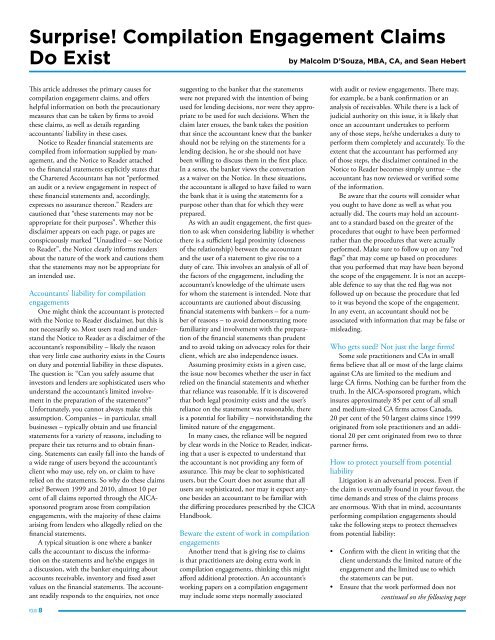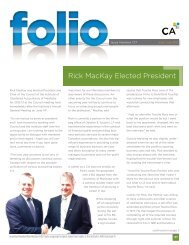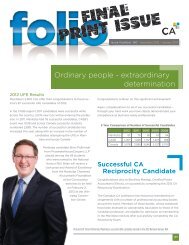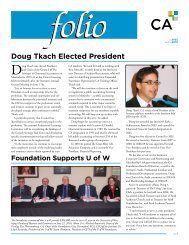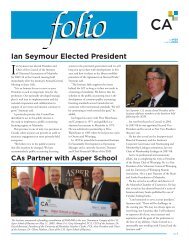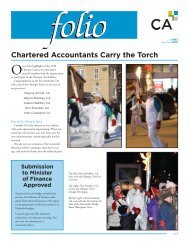James Doer Elected President - The Institute of Chartered ...
James Doer Elected President - The Institute of Chartered ...
James Doer Elected President - The Institute of Chartered ...
You also want an ePaper? Increase the reach of your titles
YUMPU automatically turns print PDFs into web optimized ePapers that Google loves.
Surprise! Compilation Engagement Claims<br />
Do Exist by Malcolm D’Souza, MBA, CA, and Sean Hebert<br />
This article addresses the primary causes for<br />
compilation engagement claims, and <strong>of</strong>fers<br />
helpful information on both the precautionary<br />
measures that can be taken by firms to avoid<br />
these claims, as well as details regarding<br />
accountants’ liability in these cases.<br />
Notice to Reader financial statements are<br />
compiled from information supplied by management,<br />
and the Notice to Reader attached<br />
to the financial statements explicitly states that<br />
the <strong>Chartered</strong> Accountant has not “performed<br />
an audit or a review engagement in respect <strong>of</strong><br />
these financial statements and, accordingly,<br />
expresses no assurance thereon.” Readers are<br />
cautioned that “these statements may not be<br />
appropriate for their purposes”. Whether this<br />
disclaimer appears on each page, or pages are<br />
conspicuously marked “Unaudited – see Notice<br />
to Reader”, the Notice clearly informs readers<br />
about the nature <strong>of</strong> the work and cautions them<br />
that the statements may not be appropriate for<br />
an intended use.<br />
Accountants’ liability for compilation<br />
engagements<br />
One might think the accountant is protected<br />
with the Notice to Reader disclaimer, but this is<br />
not necessarily so. Most users read and understand<br />
the Notice to Reader as a disclaimer <strong>of</strong> the<br />
accountant’s responsibility – likely the reason<br />
that very little case authority exists in the Courts<br />
on duty and potential liability in these disputes.<br />
<strong>The</strong> question is: “Can you safely assume that<br />
investors and lenders are sophisticated users who<br />
understand the accountant’s limited involvement<br />
in the preparation <strong>of</strong> the statements?”<br />
Unfortunately, you cannot always make this<br />
assumption. Companies – in particular, small<br />
businesses – typically obtain and use financial<br />
statements for a variety <strong>of</strong> reasons, including to<br />
prepare their tax returns and to obtain financing.<br />
Statements can easily fall into the hands <strong>of</strong><br />
a wide range <strong>of</strong> users beyond the accountant’s<br />
client who may use, rely on, or claim to have<br />
relied on the statements. So why do these claims<br />
arise? Between 1999 and 2010, almost 10 per<br />
cent <strong>of</strong> all claims reported through the AICAsponsored<br />
program arose from compilation<br />
engagements, with the majority <strong>of</strong> these claims<br />
arising from lenders who allegedly relied on the<br />
financial statements.<br />
A typical situation is one where a banker<br />
calls the accountant to discuss the information<br />
on the statements and he/she engages in<br />
a discussion, with the banker enquiring about<br />
accounts receivable, inventory and fixed asset<br />
values on the financial statements. <strong>The</strong> accountant<br />
readily responds to the enquiries, not once<br />
FOLIO 8<br />
suggesting to the banker that the statements<br />
were not prepared with the intention <strong>of</strong> being<br />
used for lending decisions, nor were they appropriate<br />
to be used for such decisions. When the<br />
claim later ensues, the bank takes the position<br />
that since the accountant knew that the banker<br />
should not be relying on the statements for a<br />
lending decision, he or she should not have<br />
been willing to discuss them in the first place.<br />
In a sense, the banker views the conversation<br />
as a waiver on the Notice. In these situations,<br />
the accountant is alleged to have failed to warn<br />
the bank that it is using the statements for a<br />
purpose other than that for which they were<br />
prepared.<br />
As with an audit engagement, the first question<br />
to ask when considering liability is whether<br />
there is a sufficient legal proximity (closeness<br />
<strong>of</strong> the relationship) between the accountant<br />
and the user <strong>of</strong> a statement to give rise to a<br />
duty <strong>of</strong> care. This involves an analysis <strong>of</strong> all <strong>of</strong><br />
the factors <strong>of</strong> the engagement, including the<br />
accountant’s knowledge <strong>of</strong> the ultimate users<br />
for whom the statement is intended. Note that<br />
accountants are cautioned about discussing<br />
financial statements with bankers – for a number<br />
<strong>of</strong> reasons – to avoid demonstrating more<br />
familiarity and involvement with the preparation<br />
<strong>of</strong> the financial statements than prudent<br />
and to avoid taking on advocacy roles for their<br />
client, which are also independence issues.<br />
Assuming proximity exists in a given case,<br />
the issue now becomes whether the user in fact<br />
relied on the financial statements and whether<br />
that reliance was reasonable. If it is discovered<br />
that both legal proximity exists and the user’s<br />
reliance on the statement was reasonable, there<br />
is a potential for liability – notwithstanding the<br />
limited nature <strong>of</strong> the engagement.<br />
In many cases, the reliance will be negated<br />
by clear words in the Notice to Reader, indicating<br />
that a user is expected to understand that<br />
the accountant is not providing any form <strong>of</strong><br />
assurance. This may be clear to sophisticated<br />
users, but the Court does not assume that all<br />
users are sophisticated, nor may it expect anyone<br />
besides an accountant to be familiar with<br />
the differing procedures prescribed by the CICA<br />
Handbook.<br />
Beware the extent <strong>of</strong> work in compilation<br />
engagements<br />
Another trend that is giving rise to claims<br />
is that practitioners are doing extra work in<br />
compilation engagements, thinking this might<br />
afford additional protection. An accountant’s<br />
working papers on a compilation engagement<br />
may include some steps normally associated<br />
with audit or review engagements. <strong>The</strong>re may,<br />
for example, be a bank confirmation or an<br />
analysis <strong>of</strong> receivables. While there is a lack <strong>of</strong><br />
judicial authority on this issue, it is likely that<br />
once an accountant undertakes to perform<br />
any <strong>of</strong> those steps, he/she undertakes a duty to<br />
perform them completely and accurately. To the<br />
extent that the accountant has performed any<br />
<strong>of</strong> those steps, the disclaimer contained in the<br />
Notice to Reader becomes simply untrue – the<br />
accountant has now reviewed or verified some<br />
<strong>of</strong> the information.<br />
Be aware that the courts will consider what<br />
you ought to have done as well as what you<br />
actually did. <strong>The</strong> courts may hold an accountant<br />
to a standard based on the greater <strong>of</strong> the<br />
procedures that ought to have been performed<br />
rather than the procedures that were actually<br />
performed. Make sure to follow up on any “red<br />
flags” that may come up based on procedures<br />
that you performed that may have been beyond<br />
the scope <strong>of</strong> the engagement. It is not an acceptable<br />
defence to say that the red flag was not<br />
followed up on because the procedure that led<br />
to it was beyond the scope <strong>of</strong> the engagement.<br />
In any event, an accountant should not be<br />
associated with information that may be false or<br />
misleading.<br />
Who gets sued? Not just the large firms!<br />
Some sole practitioners and CAs in small<br />
firms believe that all or most <strong>of</strong> the large claims<br />
against CAs are limited to the medium and<br />
large CA firms. Nothing can be further from the<br />
truth. In the AICA-sponsored program, which<br />
insures approximately 85 per cent <strong>of</strong> all small<br />
and medium-sized CA firms across Canada,<br />
20 per cent <strong>of</strong> the 50 largest claims since 1999<br />
originated from sole practitioners and an additional<br />
20 per cent originated from two to three<br />
partner firms.<br />
How to protect yourself from potential<br />
liability<br />
Litigation is an adversarial process. Even if<br />
the claim is eventually found in your favour, the<br />
time demands and stress <strong>of</strong> the claims process<br />
are enormous. With that in mind, accountants<br />
performing compilation engagements should<br />
take the following steps to protect themselves<br />
from potential liability:<br />
•<br />
•<br />
Confirm with the client in writing that the<br />
client understands the limited nature <strong>of</strong> the<br />
engagement and the limited use to which<br />
the statements can be put.<br />
Ensure that the work performed does not<br />
continued on the following page


